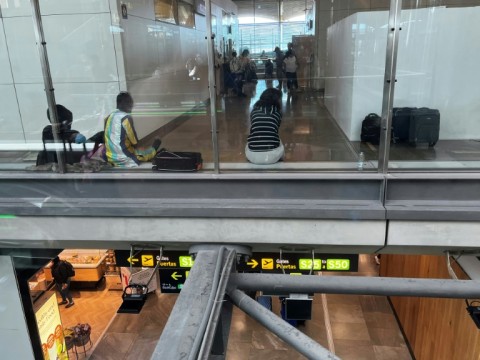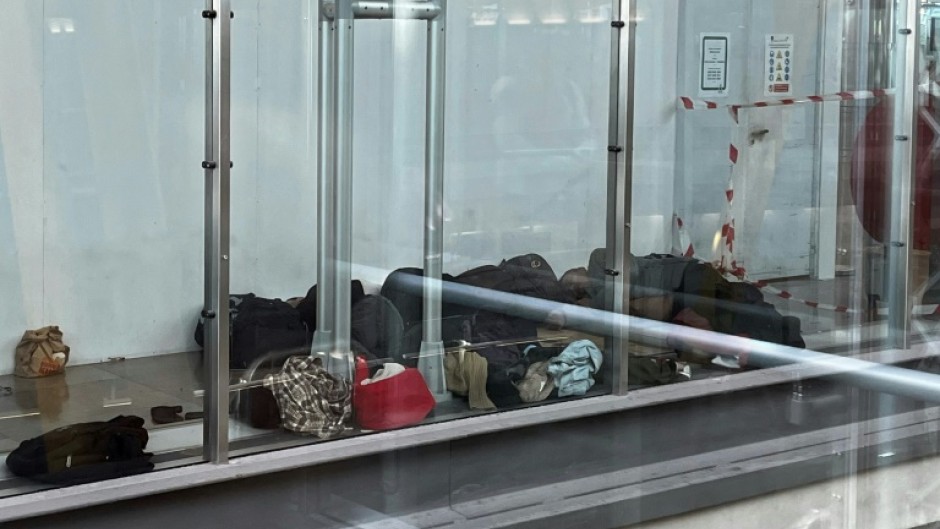MADRID - Madrid airport is struggling to cope with an unprecedented influx of African asylum seekers, who have to sleep in crammed, dirty spaces, prompting the Red Cross to stop providing services there in protest.
Hundreds of migrants, the majority from Senegal, have in recent weeks requested asylum after arriving in Madrid while on a layover to other countries, usually ones in South America that do not require entry visas from them, a police union representative who asked not to be named told AFP.
While they wait for their claims to be processed they are kept in rooms equipped with bathrooms set aside for migrants seeking asylum.
The government opened a fourth room to cope with the surge in arrivals but some asylum seekers are still forced to sleep on inflatable mattresses or share a bed, according to the Spanish Commission for Aid to Refugees (CEAR), a non-governmental organisation.
"The overcrowding and unsanitary conditions have reached critical levels, causing outbreaks of bedbugs, a build-up of garbage and a shortage of towels for personal hygiene," it said in a statement.
Videos sent to media by airport police officers show cockroaches on the floor and unsanitary showers.
More asylum claims were made at the airport in January -- 864 -- than during all of 2022, the last year for which official figures are available, when 767 were filed.
The number of migrants held at Madrid airport at the end of January stood at between 390 and 450, according to CEAR and police union SUP, up from 250 at the end of December.
- 'Not dignified' -

Overwhelmed authorities were unable to stop 17 people from escaping the holding areas by breaking windows, said a police source who asked not to be named because they were not authorised to speak on the record to the media. Another six people tried unsuccessfully to flee by crawling through a false ceiling, the source told AFP.
After raising concerns about the situation, the Red Cross took the unusual step last week of stopping providing services to asylum seekers at the airport.
"The conditions are not dignified and prevent us from carrying out our work normally. There comes a time when there is no point in continuing to do a job if we cannot take care of these people as they deserve," Jose Sanchez of the Red Cross told Onda Cero radio.
In addition to Senegal, the migrants are coming from Kenya, Mauritania, Morocco and Somalia.
A representative of the SUP union told AFP that most of them dispose of their identity papers on the plane or declare themselves to be minors to avoid immediate deportation. He asked not to be named because he was not authorised to speak to the media about the sensitive issue.
The migrants usually state in their asylum request that they are from a country in conflict, he added.
The influx is causing delays in the processing of asylum applications. At the end of January, 182 people had still not been able to formalise their claims, according to CEAR, with waiting times of up to several weeks.
- Transit visas -
While the surge in asylum claims at the airport began in August, it only came to light in December after three magistrates complained of a lack of "sanitation, hygiene and privacy" and shortage of food in the rooms hosting the migrants.
The UN High Commission for Refugees (UNHCR) on Friday demanded "urgent action" from Spanish authorities.
The interior ministry in January opened two new rooms for migrants seeking asylum, bringing the total to four. It has also disinfected the holding areas.
To try to curb the arrivals, Madrid began demanding a transit visa for Kenyan nationals passing through Spanish airports as of January 20 and will impose the same requirement on Senegalese nationals as of February 19.
Spain is one of the main gateways for immigration into Europe. A total of 56,852 undocumented migrants entered Spain last year, an 82.1 percent jump from 2022, mainly due to a record number landing in the Canary Islands.
- by Thomas Perroteau

